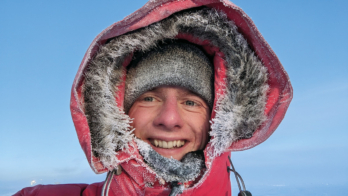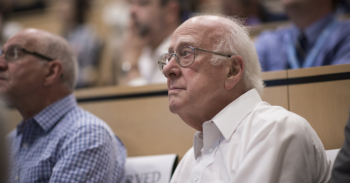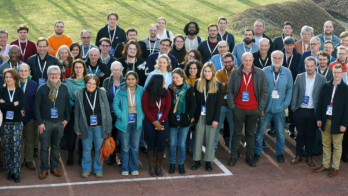
Marie-Noëlle Minard passed away on 15 May 2022. She began her career as a physicist in 1969, with a postgraduate thesis at the Institute of Nuclear Physics (IPN) in Orsay under the direction of Louis Massonnet, on the subject of high-energy neutron detectors. She joined the CNRS as a research associate, while still at the IPN, in 1972 and began her PhD studies exploring ways to detect exotic particles under the supervision of Michel Yvert. Minard defended her thesis in 1976 and joined the newly created Annecy particle-physics laboratory (LAPP). She then spent two years at SLAC, where she worked on the rapid-cycling bubble chamber. Back at LAPP in 1979, she joined the group of physicists involved in the UA1 collaboration at the CERN SppS proton–antiproton collider. The group participated in the construction of the electromagnetic calorimeter, analysis tools, data taking and physics analyses.
With her colleagues at LAPP and CERN, Marie-Noëlle created an analysis to search for Z bosons, exploiting the UA1 data extracted online by the 168E emulators – the so-called “express line”. It was by analysing these events that Marie-Noëlle spotted the first Z boson on the night of 4 May 1983 – a source of immense pleasure in her career.
In 1987 Marie-Noëlle turned to LEP physics. She created, with Daniel Décamp, the ALEPH group at LAPP. This idea came up against obstacles: there was already an L3 group, and the rule at the time was that each IN2P3 laboratory could only participate in one experiment at LEP (with one exception). This occasion demonstrated the measure of Marie-Noëlle’s determination: when she was convinced of the merits of a project, her enthusiasm and energy were such that she was able to convince even the most reluctant. She finally obtained the green light for an ALEPH team at LAPP, which, under her direction, made many contributions to the experiment. She herself was run coordinator, responsible for calibration, and a pillar of the di-fermion analysis group (measuring the Z lineshape).
In the early 2000s Jacques Lefrançois invited Marie-Noëlle to join the LHCb collaboration. The team at LAPP, under her direction, made a major contribution to the experiment, particularly in the construction and operation of calorimetric systems as well as in numerous physics analyses. Project manager of the calorimeter group during its start-up between 2008 and 2011, then assistant to the project manager until 2013, Marie-Noëlle participated in the commissioning and definition of control and calibration procedures for the calorimeters and ensured the continuous monitoring of the gains and of the aging of the cells of the electromagnetic calorimeter throughout the first period of data taking (2011–2013).
Between 2000 and 2006 Marie-Noëlle was deputy director of LAPP, during which she strongly contributed to the definition and implementation of its scientific strategy. Very careful to communicate our science to the public, her creativity enabled her to organise several original and appreciated events. Marie-Noëlle supervised nine theses. For services rendered to research, she received one of the highest awards in France (de chevalier de la Légion d’honneur).
She was certainly demanding, much more of herself than of others, but always convinced that in a group everyone makes a positive contribution. A physicist and communicator of immense talent, she was above all a woman of limitless generosity, with a sometimes caustic sense of humour. She was brave and couldn’t stand injustice, often expressing aloud what others were quietly thinking. Marie-Noëlle loved swimming, sailing, cooking, reading and welcoming her many friends and family to her table. Those who, like us, have had the chance to work with her will miss her boundless commitment, the relevance of her advice and her humanity. We are thinking of Claude, her husband of 50 years, and of her large family.





